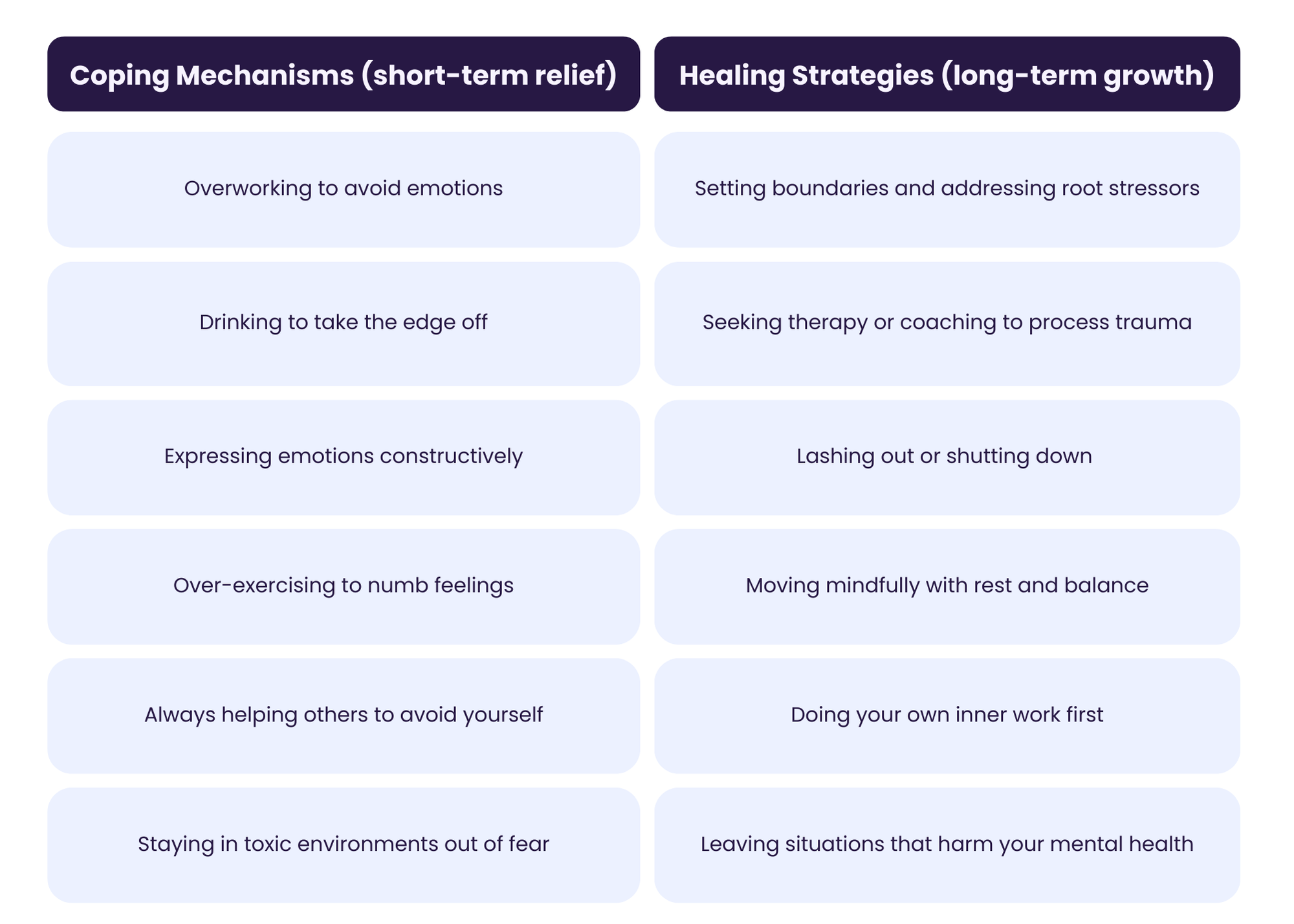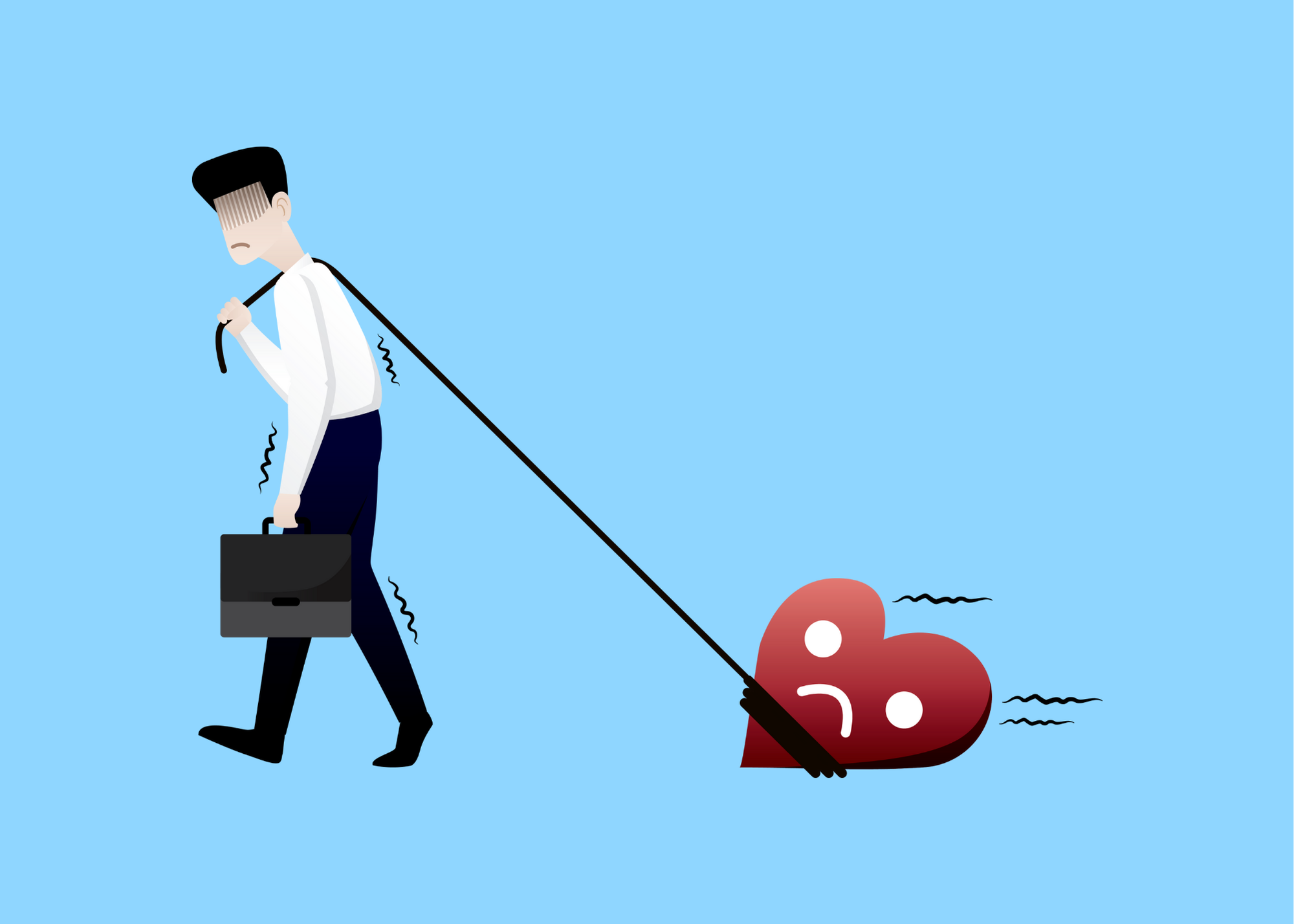Unprocessed Trauma: You Can’t Outwork It, Outrun It, or Outperform It. It Will Show Up In New Ways Until You Process It
Disclaimer: This article is based on my experience as a health and wellness coach and is not a substitute for professional mental health advice. Please consult a licensed therapist for personalized support.
Facing your pain is one of the most courageous things you can do in your lifetime.
High achievers love a challenge. You push limits, crush goals, and thrive on overcoming obstacles. But here’s one challenge many refuse to take on: facing their own pain.
But Who Wants to Suffer?
Let’s be real—why would you want to sit with pain? You’re not here for a pity party. You’re here to prove your worth. And if your survival mechanisms—overworking, hypervigilance, perfectionism—are the very things that made you successful, why would you want to dismantle them?
Maybe the trauma happened years ago. You tell yourself it’s in the past, that you’ve moved on. Or maybe you clawed your way out of hell, fought to escape the abuse, and built a life where you finally have control. Why the hell would you want to wallow in all that now?
Here’s why: Because unprocessed trauma doesn’t stay buried. You can’t outwork it, outrun it, or outperform it. It will show up—through repressed memories, PTSD triggers, chronic stress, anxiety, or even physical symptoms like gut issues and migraines. Ignoring it doesn’t mean you’re strong; it means you’re carrying a weight that will eventually break you down.
Press pause. Process this. Because the alternative is letting it control you in ways you don’t even realize.
Why You Can't Just "Push Through It"
Maybe you grew up in a home where emotions were treated as a weakness. Where crying got you punished, vulnerability was mocked, or you were told to be grateful because your “basic needs” were met—even if love, safety, and emotional support were not. Maybe you’ve worked in a toxic job where burnout, bullying, or psychological abuse was brushed off as “just part of the culture.”
And now, without realizing it, you carry that unresolved trauma into your career, your relationships, and even your health. You overperform, overachieve, and overcompensate, thinking that if you just work harder, push further, or do more, the pain will disappear. Spoiler: it won’t.
Unprocessed trauma doesn’t go away—it just finds new ways to show up. Chronic stress, burnout, anxiety, gut issues, insomnia, or that nagging sense of "never enough"—these aren't random. They’re signals. Your body remembers what your mind tries to forget.
Coping vs. Healing: Know the Difference
There’s a fine line between coping and healing. Coping mechanisms help you get through tough moments, but they don’t resolve the underlying issue. They’re temporary band-aids. Healing, on the other hand, requires you to stop running and start dealing with what’s been running you.
Here’s how coping mechanisms and healing strategies differ:
The hard truth? Many high achievers mask their trauma with productivity.
Working 80-hour weeks isn’t just ambition—it can be avoidance. Leading every committee, saying yes to everything, and being everyone’s go-to problem solver? Sometimes, that’s about control—because if you stay busy fixing everything around you, you don’t have to face what’s broken inside.
The Courage to Seek Support
Let’s be clear: facing your pain isn’t a DIY project. You can’t Google your way out of trauma or meditate your way past deep emotional wounds. This is where real strength comes in—asking for help.
Therapy, coaching, and trauma-informed support aren’t just for people who are “struggling.” They’re for anyone who wants to break free from the patterns that keep them stuck. The smartest, most successful leaders invest in personal growth. They don’t just optimize their businesses and careers; they optimize themselves. That includes mental and emotional well-being.
How to Start Processing Trauma (Without Overwhelm)
Not sure where to begin? Here’s your roadmap:
1. Recognize the Patterns
Notice where you default to coping instead of healing.
Do you overwork? Numb out? Avoid hard conversations? Identify your go-to escape routes.
2. Get Professional Support
Whether it’s therapy, coaching, or a trauma-informed specialist, work with someone who can guide you through the process safely.
3. Allow Yourself to Feel
This is the part most high achievers resist. But fully feeling your emotions—anger, grief, sadness, frustration—is what gives them the space to pass.
4. Reframe Your Story
The past happened, but it doesn’t have to define your future.
Processing trauma helps you rewrite your narrative with empowerment, not pain, as the driving force.
5. Develop New Thought Patterns & Habits
Healing isn’t just about unpacking the past; it’s about building a new foundation for your future.
Prioritize habits that support resilience, not avoidance.
Success Without Self-Sabotage
You can’t create lasting success on a foundation of unprocessed pain. Burnout, stress-related illnesses, toxic work environments—these are all symptoms of a deeper issue. Real achievement isn’t just about climbing higher, earning more, or leading bigger teams. It’s about thriving in a way that’s sustainable, fulfilling, and mentally healthy.
The bravest thing you’ll ever do isn’t grinding through another 16-hour workday. It’s turning inward, facing your past, and deciding to break the cycle. That’s real power.
Final Thoughts: Your Next Step
If any of this hit home, don’t just sit with it—do something with it. Start by acknowledging where you’ve been avoiding. Seek out a professional who can help you navigate the hard stuff. Give yourself permission to heal.
High achievers love a challenge. So take this one on—because facing your pain and doing the deep work isn’t just brave. It’s the most powerful thing you’ll ever do.
🚨 Need Help? For the One Who’s Tired of Calling It “Just Stress”
If you’re chronically exhausted, emotionally flat, or tired of running—it’s not just a bad week. It’s burnout.
This isn’t about pushing through. It’s about healing forward.
💡 Let’s get clear on what’s draining you and how to fix it. Book your free 20-minute consult today.
Disclaimer: The information provided in this article is for informational purposes only and is based on my expertise as a health and wellness coach specializing in stress management and burnout recovery. I am not a licensed therapist, psychologist, or medical professional. If you are experiencing significant mental health challenges or believe you may need professional mental health support, I encourage you to consult with a qualified therapist or healthcare provider.
Article References
The sources cited in the article:
Verywell Mind (VM). “What Is Unresolved Trauma?” VM - What Is Unresolved Trauma?
Choosing Therapy. “Unresolved Trauma: Signs, Causes, & Treatment.” Choosing Therapy - Unresolved Trauma
PsychCentral. “How Does Your Body Remember Trauma?” PsychCentral - How Does Your Body Remember Trauma?
Positive Psychology (PP). "Childhood Trauma & Its Lifelong Impact: 12 Resource.” PP - Childhood Trauma & Its Lifelong Impact
Psychology Today (PT). "The Healing Power of Emotional Tears.” PT - The Healing Power of Emotional Tears







